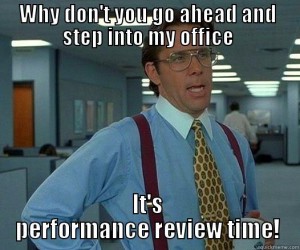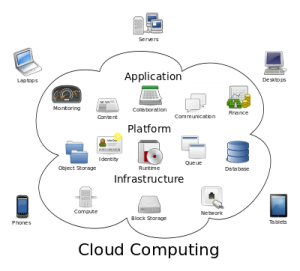-
Jessica Cracchiolo commented on the post, The Most Toxic Types of People to Avoid at Work, on the site 9 years, 6 months ago
I agree with this post. You don’t want to work with negative people because it will just effect your work and environment. I agree with Arren because I also had a few interviews and a lot of employers look for people who have a positive attitude and enjoy going to work.
-
Jessica Cracchiolo commented on the post, Nailing the group presentation, on the site 9 years, 6 months ago
I do agree with Mark’s points and i agree with your comment about its common sense but most of us don’t practice as much due to nerves. I think when presentation time comes and your nervous, it helps to take a deep breath and take your time in what you are trying to say. Its important to practice, practice, practice because sometimes someone may…[Read more]
-
Jessica Cracchiolo wrote a new post on the site MIS4596 – Section 3 Spring 2015 9 years, 6 months ago
-
Jessica Cracchiolo commented on the post, Facebook Introduces Riff, on the site 9 years, 7 months ago
This app sounds pretty fun and interesting although as a Facebook user, I have never heard of Riff. I do think the app is similar to Vine and Snapchat stories but it may not last long. Riff may be a fun app for a year or so but I think eventually people will stop using it. It also depends how frequently you go on Facebook. I rarely go on Facebook…[Read more]
-
Jessica Cracchiolo commented on the post, Will Apple Disrupt the Luxury Watch Market?, on the site 9 years, 7 months ago
I do not think Apple will disrupt the luxury watch industry because they are different customer segments. When I think of a luxury watch I think of high end classy watch that you would wear to work or if you are going somewhere nice. For Apple to create a luxury watch, thats more technologically based. The apple watch has a lot more functions and…[Read more]
-
Jessica Cracchiolo commented on the post, Progress Report for Week Ending, March 1, on the site 9 years, 7 months ago
I think most of the advice in common knowledge because its expected that when you present you should be engaging and that the product should solve a problem. I think tip number 3, “the presenters should be passionate about their product during their pitch” and tip number 4, “if the product does not solve a problem, investors will likely not care…[Read more]
-
Jessica Cracchiolo commented on the post, Progress Report for Week Ending, February 9, on the site 9 years, 7 months ago
I have never heard of an employee evaluating themselves in the real world but I do think it can be a good idea for our class. I think we should have peer evaluations and then evaluations where we evaluate ourselves. I think this method would work because the professor would see students contributions from two different view points. Of course, if…[Read more]
-
Jessica Cracchiolo commented on the post, Progress Report for Week Ending, February 16, on the site 9 years, 7 months ago
I really like the idea of Youtube releasing the option to post 360 degree videos because its different compared to the ordinary flat videos. I do think people will use it with the python script if they are truly interested in post 360 degree videos. Once one person posts a video everyone is going to start doing it.
-
Jessica Cracchiolo commented on the post, Progress Report for Week Ending, February 9, on the site 9 years, 7 months ago
I think it’s a pretty cool idea but Microsoft would have to make sure its very safe and secure because that could have a negative impact. I also agree with that you said in your post about making your face the username and not the password. I don’t think it is a good idea for your face to be the password unless it’s extremely secure and safe. In…[Read more]
-
Jessica Cracchiolo commented on the post, Progress Report for Week Ending, February 9, on the site 9 years, 7 months ago
I do think crowdfunding could have a direct correlation to disruption because they seem similar in many cases. It’s interesting that something like crowdfunding exists, and that the idea or product has to be popular enough to be marketed like jacklin stated.
-
Jessica Cracchiolo commented on the post, Happy Birthday SNL // the typists from the Carol Burnett show, on the site 9 years, 7 months ago
I like the idea of detailing all of my accomplishments throughout the year and listing them out because I would be better prepared for my performance review and it is easier to keep track all of the accomplishments. Sometimes its hard to sit and think everything you have accomplished and of course your boss won’t remember everything you have…[Read more]
-
Jessica Cracchiolo wrote a new post on the site MIS4596 – Section 3 Spring 2015 9 years, 7 months ago
I read an article in Forbes that talks about 9 things you should tell your boss at your next performance review. Forbes asked 9 entrepreneurs from the Young Entrepreneur Council what they wish their employees would tell them at their next performance review.
1) What makes you happy
2) How you want to grow
3) What you would like to work on
4) How you picture the future
5) How do you want to contribute to the company’s success
6) What you need to do for your best work
7) Which new technologies would work a lot better
8) What you want your boss to stop doing
9) What is not working, and how to make it better
These questions will help you in your next performance review with your boss and it shows you are dedicated to the success of the company and it also shows you are a dedicated employee. These questions will also help your boss become a better leader.
What do you think about this article and these questions? Do you think these questions should be answered by your boss after you have been with the company for a couple of years?
-
Jessica Cracchiolo wrote a new post on the site MIS4596 – Section 3 Spring 2015 9 years, 7 months ago
According to The Washing Post, “Research shown to be ineffective, unreliable and unsatisfactory for seemingly everyone involved. They consume way too much time, leave most workers deflated and feel increasingly out of step with reality.”
Deloitte has redesigned its whole performance management plan and how it will evaluate its employees. Deloitte’s is getting rid of nonsensical attempts to build similar goals for everyone in the organization. The company also noticed they were spending two million hours each year assigning numerical ratings to each employee so they got rid of that too.
Overall, Deloitte is replacing its old performance system with four engaging questions they are asking managers to look at instead. Washing Post stated, “At the end of every project, or once a quarter if employees have long-term assignments, managers would answer four simple questions — and only four. The first two are answered on a five-point scale, from “strongly agree” to “strongly disagree;” the second two have yes or no options:”
1. Given what I know of this person’s performance, and if it were my money, I would award this person the highest possible compensation increase and bonus.
2. Given what I know of this person’s performance, I would always want him or her on my team.
3. This person is at risk for low performance.
4. This person is ready for promotion today.
This new performance allows how to develop employees in the future based on their performance.Based on this article/post, do you think organizations should start following this new approach? Would you prefer to be evaluated on these questions or have a standard performance evaluation review? Why?
-
I think I prefer qualitative questions like in Deloitte’s new approach. Putting a numerical value on someone’s performance can sometimes be really difficult, and the evaluator would therefore waste their time trying to quantify their performance, even though they know in their head exactly how they performed. I also think the feedback would be more useful to an employee to see an answer to those four questions as opposed to a ranking, especially given how large Deloitte is.
-
-
Jessica Cracchiolo wrote a new post on the site MIS4596 – Section 3 Spring 2015 9 years, 7 months ago
http://rogerlmartin.com/thought-pillars/integrative-thinking
Roger Martin coined the word “integrative thinking” when he observed in his multiyear study of exceptional successful leaders. He found a consistent pattern to the leaders thinking approach when they were faced with challenging choices. In 2007, Roger published a book called The Opposable Mind: How Successful Leaders Win Through Integrative Thinking. The book describes the components of Integrative Thinking and provides a guide for those who want to manage their own Integrative Thinking capacity. Roger states, “Many people assume that Integrative Thinking is a skill which one must be born to demonstrate. This is definitively not the case! It is clear from this teaching experience that anyone who is willing to work at Integrative Thinking can develop the thinking pattern exhibited by the highly successful leaders that I studied.” I agree with Rogers statement because not every successful leader is born with every skill set to make them successful.
Do you think integrative thinking is an easy skill to learn? How much time do you think you need to put into learning the skill set of an integrative thinker?
-
Jessica Cracchiolo wrote a new post on the site MIS4596 – Section 3 Spring 2015 9 years, 7 months ago
This year was the Consumer Electronics Show 2015 (CES) filled with big bang disruptors. There were disruptors from incumbents and start-ups with the likelihood to cause big changes. The five most disruptive innovations were:
1) Transportation – Autonomous Vehicles
2) Health and Fitness – The Quantified Self
3) Manufacturing – 3D Printing and Robotics
4) The Internet of Things
5) Augmented Reality
I found this article very interesting because the top five most disruptive innovations at the CES were covered in our class through our case analysis. Two of the five disruptive innovations I found amusing were the autonomous vehicle and 3D printing. I would have never thought in a million years we would have a self-driving car. When I listened to the presentation in class I was very fascinated with the information. My case analysis was on 3D printing which I also thought was interesting because I never knew much about the product. After reading this article, I learned a lot more about 3D printing and the new features. If technology is this advanced in 2015, I can only imagine how advanced technology will be 30 years from now.
The disruptive innovations at the CES fall in the “early market experiment stage of big bang disruptions.” According to Forbes, “Some–perhaps most of them–will never make it to mainstream success. But even those that don’t succeed send a strong signal to incumbents of imminent disruption when some entrepreneur hits on the right combination of new technologies and business models.”
What are your thoughts on this years Consumer Electronic Show? Do you think the innovations listed in this article and what we discussed in class will make it to mainstream success? Why or why not?
-
I think autonomous vehicles have the potential to make it to mainstream success, and I agree with its position as #1 on the list. My belief is that autonomous vehicles will inevitably become mainstream, not because of successful business pitches, but because of necessity. Over 1.2 million people die unnecessarily each year due to automobile-related accidents, and many consumers recognize the extreme safety implications of having vehicles become autonomous. In the same sense that medicine is a necessity and consumers find value in curing their ailments, consumers, in my opinion, will WANT to have safer automobiles in order to protect their own lives, even if it means paying a pretty penny. The technology already exists for autonomous vehicles, it just needs to get ready for mass market. Of course, the roads will never truly be 100% safe unless EVERY vehicle is autonomous (which reminds me of a social movement called the Zeitgeist Movement that proposes that society should adopt this), which is another issue to eventually tackle, but in just 20 years this technology has the capability to completely disrupt the market and the automobile industry.
-
-
Jessica Cracchiolo wrote a new post on the site MIS4596 – Section 3 Spring 2015 9 years, 8 months ago
-
Jessica Cracchiolo wrote a new post on the site MIS4596 – Section 3 Spring 2015 9 years, 8 months ago
On Thursday we briefly talked about Uber’s business model. I find Uber an interesting and smart start up that is becoming very popular. I came across an article that talks about the “Uberization of work may soon be coming to your chosen profession.” a range of companies are trying follow Uber’s business model in order fields from grocery shopping, legal services, to even medicine. The benefit of Uberization is that technology can make your work life more flexible because it will allow you to fit multiple jobs around your schedule. An economist at the University of California stated, “this on-demand economy means a work life that is unpredictable, doesn’t pay very well and is terribly insecure.” Most people would rather have good, well-paying, regular jobs. Uber is a growing company and there are always new opportunities for employment.
What do you think about Uber’s business model? Do you think other fields that follow this business model will be successful? Would you want to work for a company like Uber? Why or why not?
-
I found the article you located to be intriguing, and I appreciated the balanced perspectives of Dr. Sundararajan—pro-uberization—and Dr. Reich—anti-uberization.
What worries me, to an extent, about the prospect of a largely “uberized” workforce, is the need for a worker to hold multiple jobs to compensate for the absence of full time employment with benefits. To fill financial gaps, workers will feel compelled to “[monetize] their […] downtime.” Over the prospect of simultaneously being “an Uber driver, an Instacart shopper, an Airbnb host and a Taskrabbit,” I prefer the prospect of full time employment complemented by professional or academic study, hobbies, and other activities.
I think that while other fields of business may successfully employ Uber’s business model, professional groups will indeed gain popularity as people realize the value of work stability in contrast with the flexibility of by-the-job payment.
-
-
Jessica Cracchiolo wrote a new post on the site MIS4596 – Section 3 Spring 2015 9 years, 8 months ago
Facebook launched “ThreatExchange” which is an Application Programming Interface (API) that allows companies to share information with each other about cyber attacks. A few companies including Facebook were demanding to stop a bonnet that was abusing their services to send spam. A manager of the Threat Infrastructure team at Facebook stated, “We quickly learned that sharing with one another was key to beating the botnet because parts of it were hosted on our respective services and none of us had the complete picture.” ThreatExchange is built on Facebook’s infrastructure and the information includes domain names, malware samples, and other indicators of compromise. The platform allows companies to share certain information that share similar issues. The goal of this platform is for organizations to learn from each other and make their systems safer. “That’s the beauty of working together on security. When one company gets stronger, so do the rest of us.”
Do you think ThreatExchange is a good way for companies to share their information regarding systems and hacking? Do you think only social media sites are going to use this platform? Or do you think other industries will also use this platform? Why?
-
I think that the Threat Exchange is a great idea. Hackers and other nefarious parties all share information and the best tips and tricks so it is smart for companies to share how to prevent these attacks. Also, if something works to get into one company the odds of it being tried on another is high so if they share how to prevent attacks it will help everyone in the long run. I am not sure whether only social media sites will use this particular application but if they do something similar to this needs to be developed for other industries. I think that other industries will be slower to adapting to this platform and may decide to use a different platform to do a similar thing. Traditionally non social media companies have been slower to adapt to changing social media trends.
-
-
Jessica Cracchiolo commented on the post, "Cyberattacks" Is our information really secure?, on the site 9 years, 8 months ago
I don’t think companies are getting lazy with IT security. I do think hackers are getting smarter because they are always looking for new ways to hack systems. Hearing about companies getting hacked affects other companies because they don’t want the same thing happening to them. The article I posted a few days ago discusses how CIOs are concerned…[Read more]
-
Jessica Cracchiolo commented on the post, The Next Big Technological Hub, on the site 9 years, 9 months ago
Personaly, I don’t think Las Vegas has the potential to become the next technological hub because when I think of Vegas I think of a vacation spot that people go to for a few days. There is not much to do in Las Vegas other the entertainment and I don’t think professionals would want to live there. It may be cheaper but I don’t think it would have…[Read more]
- Load More
Connect and innovate with an elite information systems program
Footer
MANAGEMENT INFORMATION SYSTEMS
Fox School of Business
Temple University
210 Speakman Hall
1810 N. 13th Street
Philadelphia, PA 19122









I think that in 10 years technology will change much more than just our careers. I think that the way we interact with our families, pets, friends, etc. will be altered- whether it be good or bad. I think that technology is also going to make a lot of careers obsolete, as more and more things get automated. I also think it can make certain jobs more efficient though.
Yes, I strongly believe that our lifestyles will change due to technology in the next ten years. Based off the past and how it has already done so, to me is almost proof that it will happen again in the future. I think that a lot of existing jobs will be done by technology.I feel that the technology will be a cheaper and more efficient way to do some jobs in the next ten years.